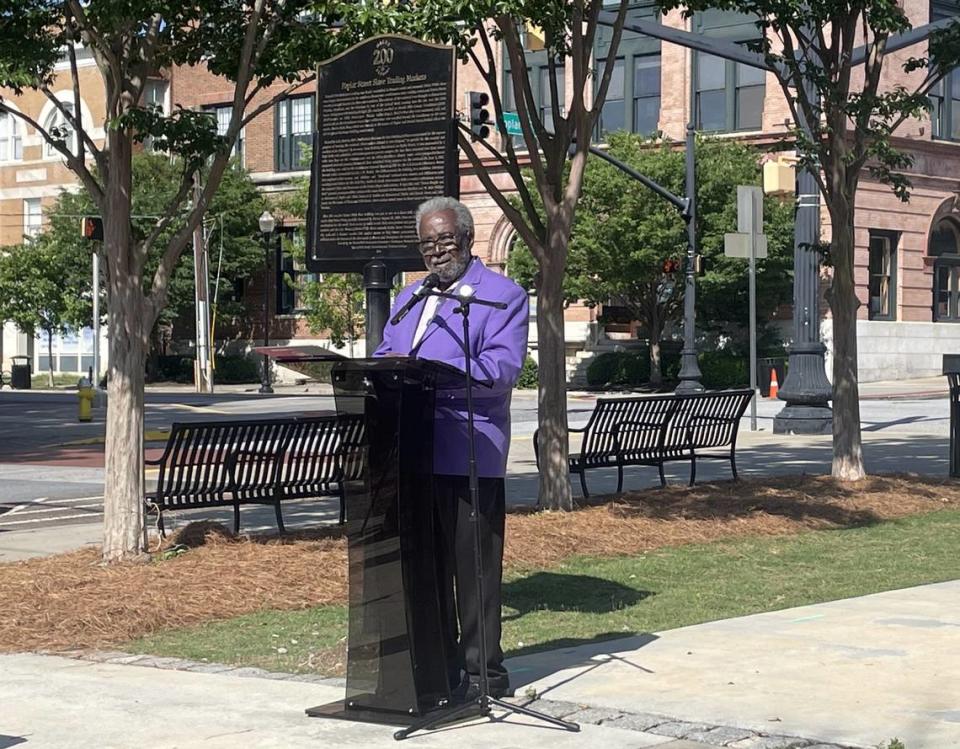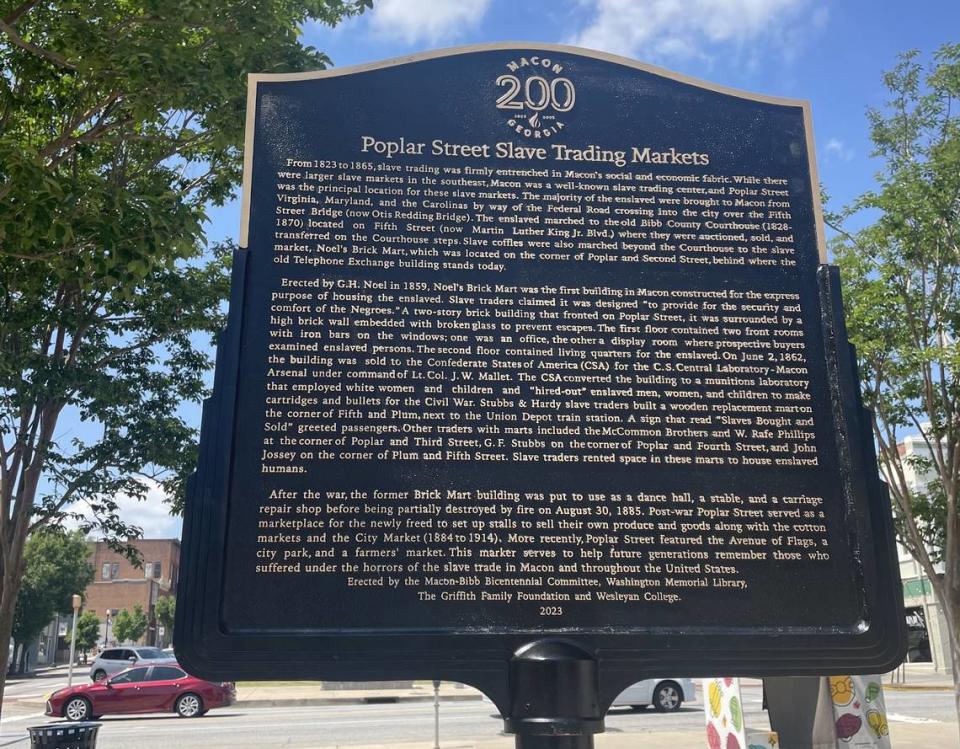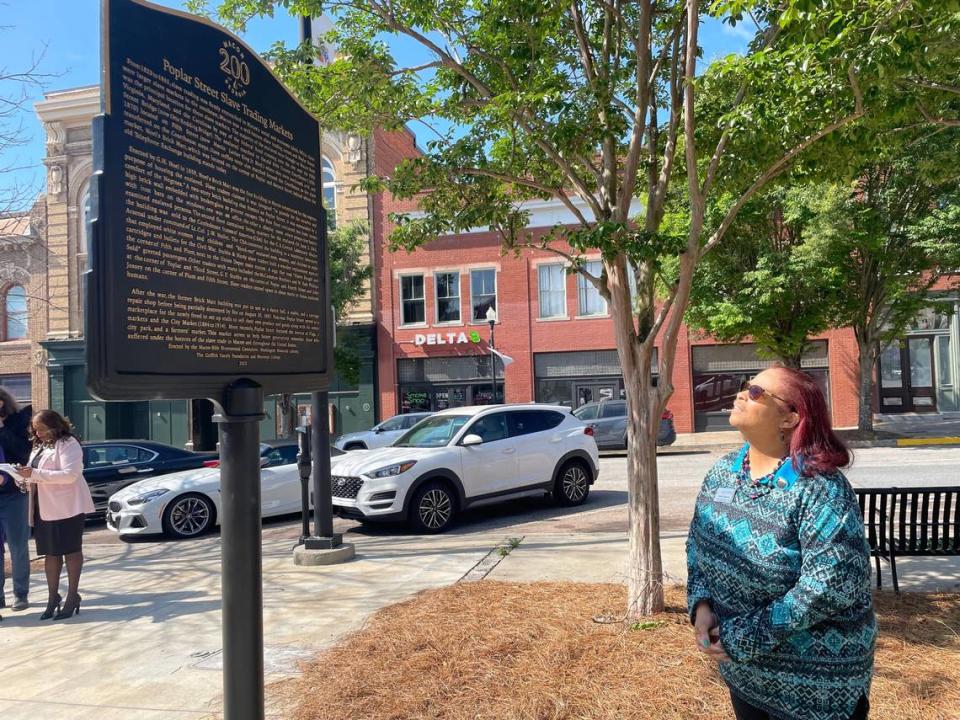Bronze markers highlight Black historical sites in Macon. Here’s where they are.
A few bronze markers now highlight significant spots for Black history in Macon, thanks to the efforts of several Macon organizations who unveiled the markers Monday.
The signs help celebrate the city’s bicentennial, which happened last year, and its deep-rooted, rich Black history. One marker is dedicated to the historic African-American Cotton Avenue District.
The marker reads, in part:
“Known as ‘Macon’s Black Wall Street,’ the District is historically important as an educational, professional, business, and residential area for African Americans in Middle Georgia starting in the late 19th century and continuing into the mid-20th century.”
The other marker is dedicated to Poplar Street slave trading markets and reads, in part:
“From 1823 to 1865, slave trading was firmly entrenched in Macon’s social and economic fabric. While there were larger slave markets in the southeast, Macon was a well-known slave trading center, and Poplar Street was the principal location for these slave markets.”
Alex Habersham, founder of Macon-Middle Georgia Black Pages, said it is extremely important that all of Macon recognize and acknowledge the significant contributions that Macon’s Black community has made dating back to the era of slavery and before.
“Macon has such a rich history of individuals who made contributions which have influenced the current educational, economic, historical, cultural, and musical status of this community,” he said. “Moreover, recording and archiving these events and personalities aligns with the Bicentennial mission of recognizing the past to build a more harmonious future.”
Habersham, who is also co-chair of the Macon200 bicentennial committee, said the new markers along with the Heritage Trail serve as a much-needed permanent reminder of the impact, growth and influence of Black Maconites throughout the years.
He said the committee made a conscientious effort to appropriately recognize the measurably significant contributions of Macon’s Black population in every area.

The project was funded by Macon-Bibb County’s bicentennial committee, which partnered with Wesleyan College’s Lane Center for Social and Racial Equity, Washington Memorial Library, and Visit Macon to create the markers, according to Julia Morrison. Morrison is the marketing chair of Macon200 who served on the subcommittee for the Black Heritage Trail markers.
Morrison said the three bronze markers — two of which have been placed — are made of a material estimated to last more than 500 years. More aluminum signs with QR codes, inviting visitors to download the Tour Macon app and complete a Black History Trail walking tour, will also be installed.

Morrison said the Bicentennial Committee seeks to strengthen civic pride by educating the community about local history, celebrating accomplishments, acknowledging the past and promoting a harmonious future.
Muriel McDowell-Jackson, the head genealogical and historical librarian at Washington Memorial Library who authored the markers, said they will help people understand and acknowledge that Black residents have contributed to the history of the community since its beginning.
“With people dying and buildings being torn down or retrofitted for new purposes the history of the sites gets lost. But if we are able to document the important events that occurred there it makes the loss less painful,” she said. “If we had the money, the next site for a bronze maker would be on Madison Street which was the site of the Georgia Academy for the Blind Colored School and Amelia Hutchings Library, the first permanent library for African Americans in Macon.
“The same building was used for both the school and the library but the building was renovated for use as a library.”

Brandi Simpson Miller, Wesleyan College history professor, said the college has a vested interest in the history of people of African descent.
“A lot of the students we serve are of African descent and are from the area, so they want to know about where they come from. And we want all our kids to know this,” she said. “I was a K-12 teacher, and I’ve taught this history and saw how much of an impact it had on all our kids, no matter their background. It helps us to understand how we got to where we are today.”
The markers are located on Pine Street and Poplar Street downtown. A third marker will be put on Mulberry Street close to the Martin Luther King Jr. Boulevard intersection early this summer, according to Morrison.
The major initiative for the bicentennial is the Bicentennial Park, a park in East Macon that will serve as valuable public space and commemorate the vibrancy of the city.

